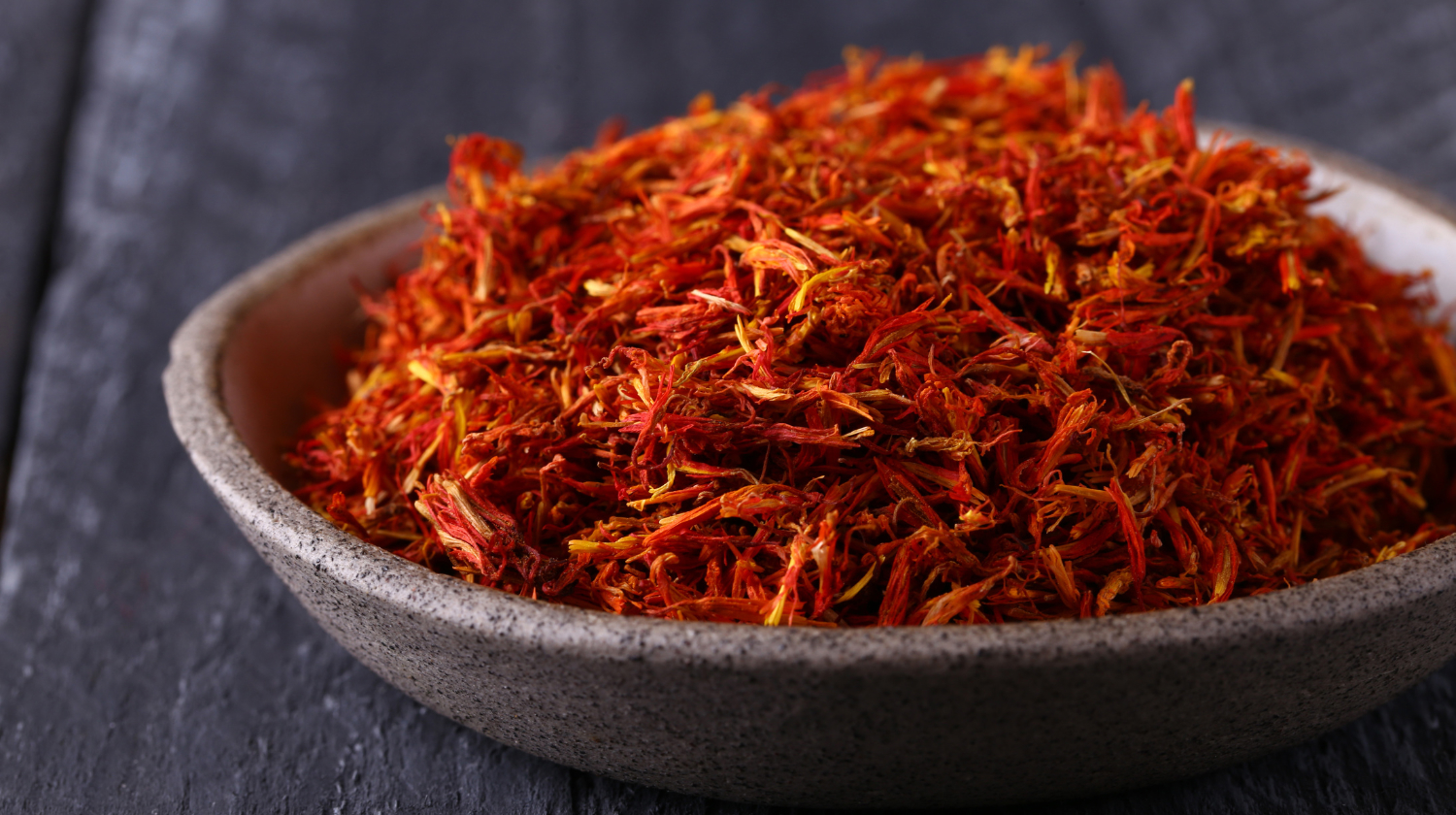Saffron For Depression 2024: Benefits, Dosage & Side Effects

Experiencing signs of depression but want to try an alternative to modern medication? If so, you may have heard that saffron can be an effective substitute.
Saffron, a spice extracted from the autumn crocus flower, has shown medicinal promise in more ways than one—combatting the signs of psychiatric conditions, neurological disorders, sexual dysfunction, and more.
Continue reading to find out what saffron is, the effectiveness of saffron for depression, and the potential side effects of using saffron as a medication for those with depression.
Is Saffron Good For Depression?
Saffron for depression has proven effective inwith patients with mild to moderate major depressive disorder.
However, we should take saffron’s positive effect on depression with a grain of salt, as randomized controlled trials exploring saffron’s effectiveness may be biased.
Furthermore, saffron can have toxic effects when consumed in high doses. Therefore, caution is needed when considering taking saffron supplements. Always seek professional help before taking any herbal medicine.
What Is Saffron?
Saffron is a spice that sports a brilliant crimson color. Saffron comes from a plant called the Crocus sativus L—also known as the “saffron crocus” or “autumn crocus”—a plant within the Iris family.
Saffron is popular within the culinary world due to the vibrant color, strong aroma, and bitter flavor it brings to dishes. Its gross popularity combined with the high cost of its harvesting process makes it the most expensive spice in the world.
There is some confusion over where saffron originated—some believe saffron extract comes from Iran, while others suggest Greece and Mesopotamia are where saffron originally resided. However, nowadays saffron is used all across the globe for many different purposes.
Research looking into saffron’s chemical properties found that it contains chemical elements that may be capable of providing certain medicinal benefits. Let’s look at these next.
Saffron Benefits
While Crocus sativus has been used as an herbal sedative and to lessen the severity of epileptic convulsions in the past, recent research involving randomized clinical trials also identified saffron’s effectiveness in treating several other health ailments
Saffron contains around 40 – 50 active therapeutic compounds including crocin, picrocrocin, crocetin, and picrocrocin. These compounds have antioxidant, neuroprotective, and anti-inflammatory properties.
Saffron has been associated with benefiting the following conditions:
Let’s look at each in turn.
Saffron To Treat Psychiatric Disorders

Evidence suggests that saffron extract can relieve mild to moderate anxiety symptoms. There was no significant difference between the effectiveness of saffron supplementation versus citalopram, one of the main drugs prescribed for anxiety. However, this isn’t altogether surprising, as the main active saffron constituent is similar to those in drugs for psychiatric disorders.
Furthermore, a meta-analysis looking at the effect of Crocus sativus on mood found that saffron supplementation can significantly boost mood.
Saffron To Treat Neurological Disorders

Randomized controlled trials[2] demonstrate that Crocus sativus can reduce the effects of mild cognitive impairment or Alzheimer’s disease. Saffron’s effects were significantly greater than the placebo group.
Saffron supplement consumption before bed has also proven highly effective[2] at reducing insomnia symptoms and improving overall sleep quality.
Saffron To Treat Sexual Dysfunction

Crocus sativus appears particularly beneficial among males for lessening sexual dysfunction. Research from a randomized controlled trial showed that Crocus sativus consumption could increase the number of sperm with normal shape and sperm mobility.
Further evidence also highlights saffron’s ability to improve patients’ satisfaction with intercourse,[2] sexual desire, organismic function, and general relationship contentment.
Crocus sativus may also reduce the decreases in sexual libido associated with specific antidepressant medication,[3] including fluoxetine-induced sexual impairment.
Additional Benefits Of Saffron

Alongside these benefits, saffron may be capable of:
- Reducing high blood pressure.[4]
- Supporting skin health.[5]
- Affecting certain cells[6] involved in the body (evidence suggests saffron can kill cancer cells and improve brain cells).
- Improving immune system[7] function.
- Lowering blood sugar levels.[8]
Furthermore, Crocus sativus also shows promise at reducing the symptoms of premenstrual syndrome[2] in women—including the anxiety and depression symptoms associated with this. It may also ameliorate snack cravings,[2] helping you to banish unhealthy eating habits and support weight loss.
However, it’s important to note that the sample sizes of the randomized double-blind clinical trial research on saffron’s efficacy are small. There is often a high risk of bias involved with these studies, which could make saffron supplementation appear more effective than it is.
But how about saffron as a treatment for depression?
How Saffron Works For Depression
According to one meta-analysis, Crocus sativus has certain antidepressant properties. Namely, saffron stigma and the petals from Crocus sativus L can effectively treat mild to moderate depression after six-week administration via oral capsules.
When compared to a double-blind placebo-controlled group, the saffron group showed significantly reduced symptoms of depression, including major depressive disorder. Furthermore, when researchers compared saffron for depression patients with common forms of antidepressant drugs (such as fluoxetine and imipramine), saffron showed similar levels of efficacy.
Studies also demonstrate Crocus sativus has a positive effect on mothers with postpartum depression, showing a greater reduction in depression symptoms than in the placebo group.
While there’s much more to understand about how Crocus sativus can elicit such potent responses in depressed patients, some research suggests that it’s due to saffron’s effects on certain neurotransmitter systems,[9] although these exact systems remain unclear.
But there’s one key factor to consider when using saffron Crocus sativus L as depression treatment—how much saffron for depression—what’s the right dosage? More on that next.
Saffron For Depression Dosage
You may be wondering does saffron have adverse effects? In simple terms, yes—it can. Two of the main active saffron constituents, crocin and safranal, possess toxic properties. However, research into saffron’s true adverse effects is limited—with the majority of findings stemming from animal research.
In randomized clinical trials in those with mild to moderate depression, Crocus sativus is typically administered in pure form in capsules between 20 and 400 mg per day.
Evidence suggests that Cocus sativus can have toxic effects[10] and lead to adverse events when administered at high doses of 5000 mg or higher. At extremely high doses of 20000 mg, Crocus sativus can be fatal. Lower doses of around 1500 mg per day are considered safe.
Regardless of whether saffron Crocus sativus l has toxic effects or not, it’s important to seek professional help when considering taking saffron supplements, as there are still side effects and safety tips to be aware of.
Safety Tips & Side Effects
Consuming Crocus sativus in large doses may lead to adverse events, and much more research is needed to truly unpick saffron’s toxicity. However, it’s better to be safe than sorry—stick to safe, lower doses of saffron, such as 1500 g per day.
It’s also important to know that saffron Crocus sativus L hasn’t been properly tested on pregnant women and breastfeeding women, so taking caution here is recommended.
And while it may show improvements in major depression, it may have harmful effects on other conditions, such as bipolar disorder—disrupting the balance of excitability and impulsivity.
Even at low doses, Crocus sativus has common side effects. Some of the main side effects[6] of taking saffron extract daily are:
- Changes in appetitive
- Nausea
- Headache
- Vomiting
- Dizziness
- Dry mouth
- Fatigue
- Anxiety
- Periods of overactive behavior
- Restlessness
- Drowsiness
- Stomach pain
- Tremors
- Insomnia
Conclusion
Saffron Crocus sativus L is an expensive spice with potential medicinal properties. It contains active ingredients that may curb symptoms of anxiety, Alzheimer’s disease, premenstrual syndrome, and sexual dysfunction.,. Furthermore, it has proven capable of reducing mild to moderate depression symptoms.
However, you should still err on the side of caution when it comes to saffron Crocus sativus L. Due to the toxicity of safranal, saffron consumption in high doses may cause adverse events. Furthermore, Saffron Crocus sativus L has been shown to elicit various side effects, similar to prescription medication.
Always seek advice from a health care professional before taking all herbal medicines, including saffron, to avoid unnecessary adverse effects.
+ 10 sources
Health Canal avoids using tertiary references. We have strict sourcing guidelines and rely on peer-reviewed studies, academic researches from medical associations and institutions. To ensure the accuracy of articles in Health Canal, you can read more about the editorial process here
- Cerdá-Bernad, D., Costa, L., Serra, A.T., Bronze, M.R., Valero-Cases, E., Pérez-Llamas, F., Candela, M.E., Arnao, M.B., Barberán, F.T., Villalba, R.G., García-Conesa, M.-T. and Frutos, M.-J. (2022). Saffron against Neuro-Cognitive Disorders: An Overview of Its Main Bioactive Compounds, Their Metabolic Fate and Potential Mechanisms of Neurological Protection. Nutrients, [online] 14(24), p.5368. doi:https://doi.org/10.3390/nu14245368.
- Shamabadi, A., Hasanzadeh, A. and Akhondzadeh, S. (2022). The neuropsychotropic effects of Crocus sativus L. (saffron): an overview of systematic reviews and meta-analyses investigating its clinical efficacy in psychiatric and neurological disorders. Avicenna journal of phytomedicine, [online] 12(5), pp.475–488. doi:https://doi.org/10.22038/AJP.2021.19300.
- Jing, E. and Straw-Wilson, K. (2016). Sexual dysfunction in selective serotonin reuptake inhibitors (SSRIs) and potential solutions: A narrative literature review. Mental Health Clinician, [online] 6(4), pp.191–196. doi:https://doi.org/10.9740/mhc.2016.07.191.
- Hooshmand‐Moghadam, B., Eskandari, M., Shabkhiz, F., Mojtahedi, S. and Mahmoudi, N. (2021). Saffron ( Crocus sativus L.) in combination with resistance training reduced blood pressure in the elderly hypertensive men: A randomized controlled trial. British Journal of Clinical Pharmacology, [online] 87(8), pp.3255–3267. doi:https://doi.org/10.1111/bcp.14746.
- Naeimifar, A., Ahmad Nasrollahi, S., Samadi, A., Talari, R., Sajad Ale‐nabi, S., Massoud Hossini, A. and Firooz, A. (2020). Preparation and evaluation of anti‐wrinkle cream containing saffron extract and avocado oil. Journal of Cosmetic Dermatology, [online] 19(9), pp.2366–2373. doi:https://doi.org/10.1111/jocd.13284.
- Bostan, H.B., Mehri, S. and Hosseinzadeh, H. (2017). Toxicology effects of saffron and its constituents: a review. Iranian journal of basic medical sciences, [online] 20(2), pp.110–121. doi:https://doi.org/10.22038/ijbms.2017.8230.
- Lopresti, A.L. and Drummond, P.D. (2014). Saffron (Crocus sativus) for depression: a systematic review of clinical studies and examination of underlying antidepressant mechanisms of action. Human Psychopharmacology: Clinical and Experimental, [online] 29(6), pp.517–527. doi:https://doi.org/10.1002/hup.2434.
- Samarghandian, S., Azimi-Nezhad, M. and Farkhondeh, T. (2017). Immunomodulatory and antioxidant effects of saffron aqueous extract ( Crocus sativus L.) on streptozotocin-induced diabetes in rats. Indian Heart Journal, [online] 69(2), pp.151–159. doi:https://doi.org/10.1016/j.ihj.2016.09.008.
- Ann Hausenblas, H., Heekin, K., Mutchie, H.L. and Anton, S. (2015). A systematic review of randomized controlled trials examining the effectiveness of saffron (Crocus sativus L.) on psychological and behavioral outcomes. Journal of Integrative Medicine, [online] 13(4), pp.231–240. doi:https://doi.org/10.1016/s2095-4964(15)60176-5.
- Lopresti, A.L. and Drummond, P.D. (2014). Saffron (Crocus sativus) for depression: a systematic review of clinical studies and examination of underlying antidepressant mechanisms of action. Human Psychopharmacology: Clinical and Experimental, [online] 29(6), pp.517–527. doi:https://doi.org/10.1002/hup.2434.



